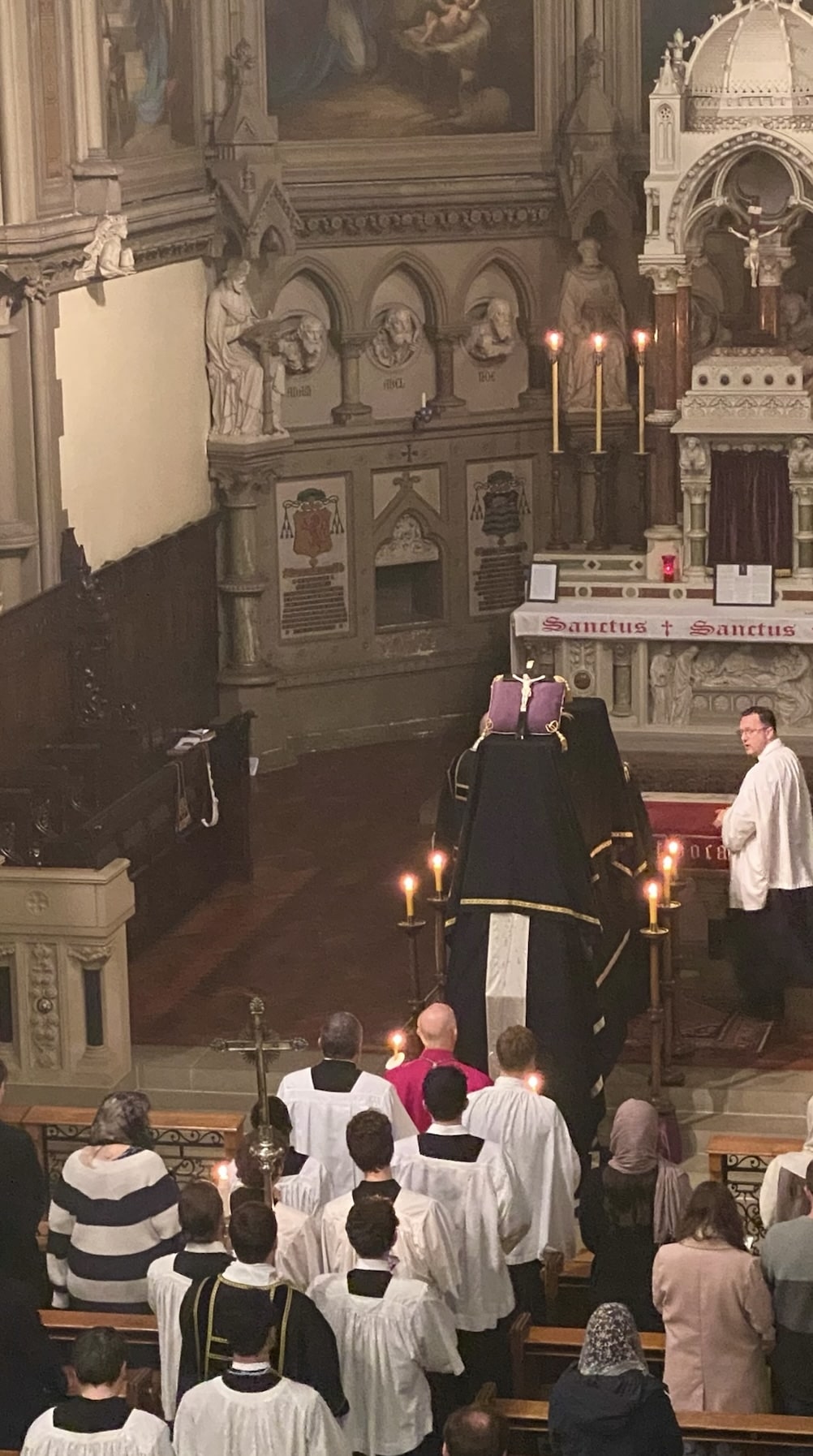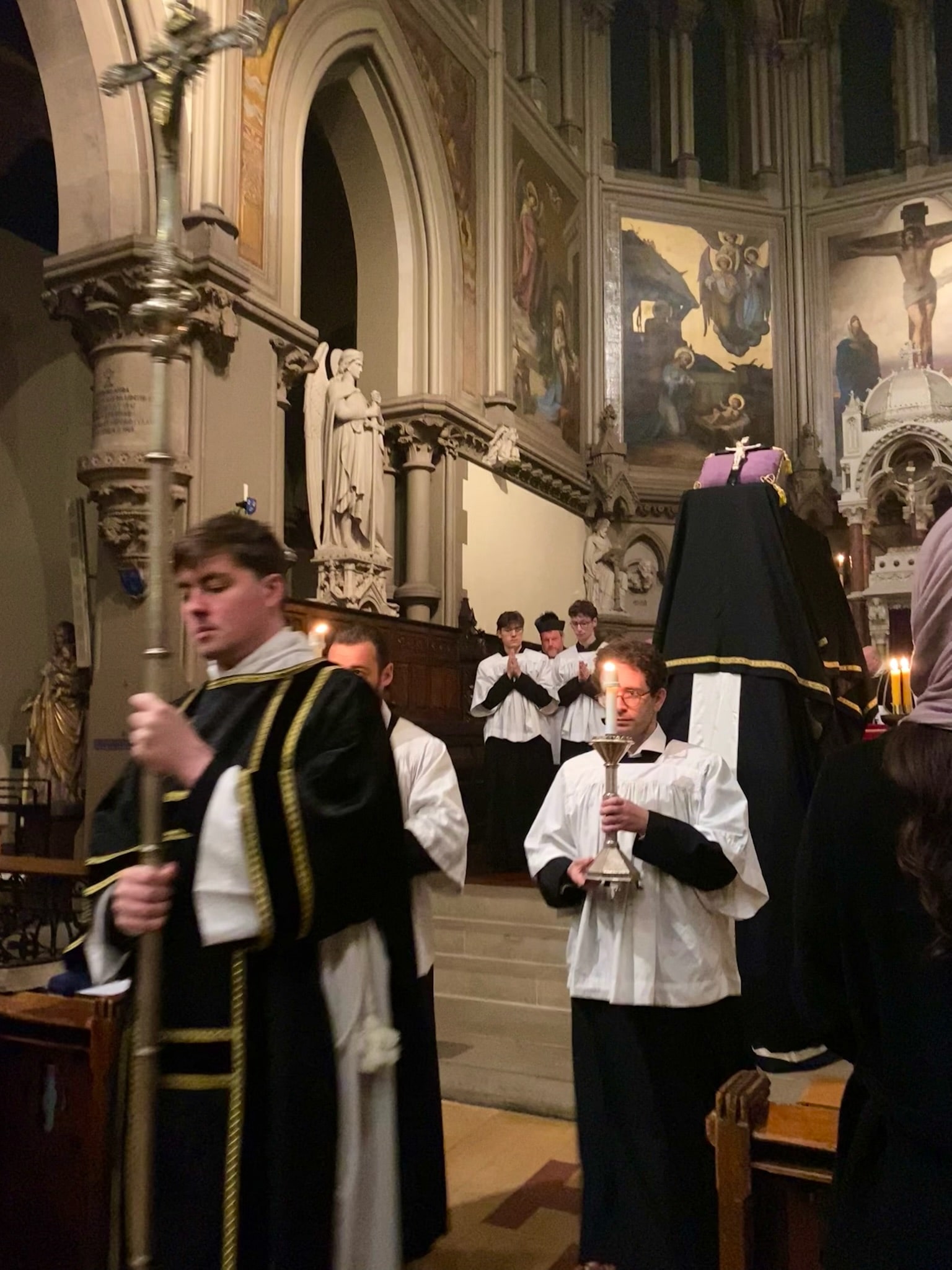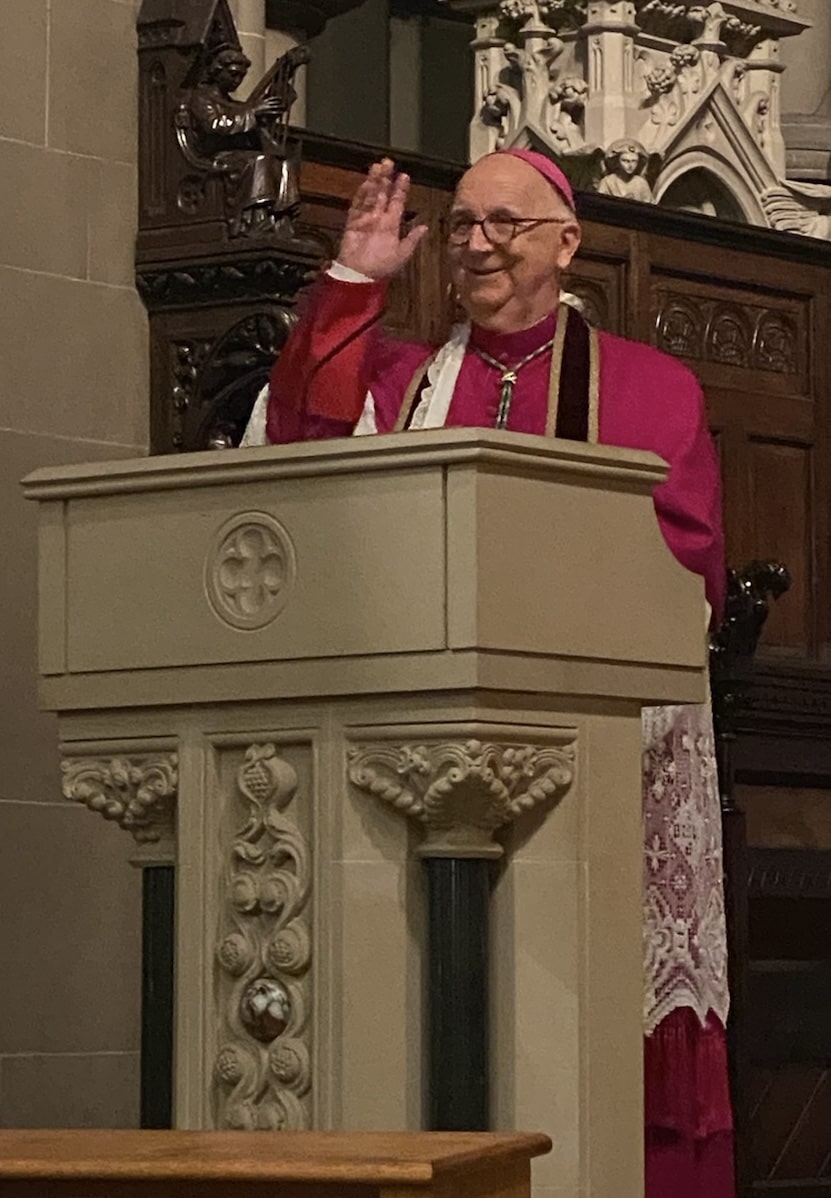

Before his death, St Aloysius Gonzaga wrote in his farewell letter (1591) to his mother: "Illustrious lady, be ever vigilant and take care not to offend this infinite love of God! You would do so if you were to mourn me as if I were dead, when I live before the face of God and can help you even more than in this life through my intercession in your concerns.‘
Whereas in the past people expressed their confident belief in a return to the ’eternal home‘ with God, today people write of their ’dissolution in the universe’: ‘I said goodbye today, the solution is in space.’ (an obituary). Apparently, it is not possible to come to terms with the definitive end: ‘I have moved. My new address is: Cimitero Accatolico, Via Gaia Cestio 6, Rome. I look forward to visits.’ (Tomb inscription in Rome's so-called atheist cemetery). When we attend funerals today, almost everyone assumes that the deceased is now at peace. The texts and prayers are positive. It is rare to pray for the forgiveness of the deceased's sins. In earlier times, death was brief and usually quick. What mattered was agood death, pleasing to God. People feared a sudden, unprepared death! Today, people live longer and die slowly and painfully. Many therefore wish for a sudden, unexpected, quick and painless death! But they all forget to prepare for it.
‘Live like people who die every day,’ says the desert father Anthony to his brothers before his death. Faith in Jesus Christ and his trusting death into the hands of the Father allow us to overcome our fear of death. ‘Why be afraid of death?’ says the blind monk of the Grande Chartreuse in the film. ‘The Great Silence.’ –‘The closer you get to God, the happier you are. That is the fulfilment of our lives.’
In general, everyone dies as they have lived. It is reported of St Martin that his face at death was like the face of an angel. Francis dies naked on the floor of the Portiuncula. Benedict dies praying, standing, supported by two brothers.
Many people die unprepared, unrepentant and without faith. This reveals a major shortcoming in the proclamation of the Gospel since the Second Vatican Council. People want to hear good news, not threatening messages, say the pastors. So priests no longer warn people against sin. They speak neither of purgatory nor of hell. People are not worried about being lost for eternity. They think that after death everything will be fine, or that after death there will be nothing at all. They do not reckon with the fact that every life must answer to the eternal Judge.The Last Judgement in the Sistine Chapel is, so to speak, a thing of the past, not of the future, and has nothing to do with me. What a delusion! All pastors proclaim God's mercy. But they omit many passages from the Gospel where Jesus speaks very clearly about judgement and the consequences of our unrepentant lives after death. People lull themselves into a false sense of security, even if they kill themselves prematurely with assisted suicide. Do they really believe that God agrees with everything they think and do? The parable of the guest who arrives at the wedding hall without wedding clothes teaches us that we will be excluded from eternal life if we wear dirty clothes, and that this is very painful for those affected, in contrast to those who have washed their robes in the blood of the Lamb and, following the parable of the rich man and poor Lazarus, rest in Abraham's bosom.
John of the Cross uses the image of a log of wood. When it is damp and thrown into the fire, it suffers, sighs and smokes noisily. It must sweat out all its moisture before it catches fire and then burns quietly and blissfully in the fire, having itself become fire. This is a very telling image for understanding the transformation that must take place in purgatory before we can unite with the fire that is God Himself and be eternally blessed in Him. We are called to become fire ourselves. But first, all moisture, all sin, must be removed. Fire does not actually hurt anyone. It only consumes those who are not of its nature.

So let us be grateful that we are being purified already in this time and sweating out all our moisture, so that when we encounter the divine fire, we will not smoke and lament but burn and shine blissfully. Let us pray for the deceased, that they may receive comfort, and let us not categorically reject the thought of judgement!‘ Only there will I truly be human!’ wrote St. Ignatius of Antioch to the Romans before his martyrdom. He heard within himself the sound of living waters calling to him: Come to the FATHER! Not all people are ‘God-bearers’ like him.He himself chose this name for himself: Theophoros! How many people die in the company of demons and with evil bonds to them. We must pray for them. ‘This is the will of God—your sanctification’ (1 Thess 4:3). ‘Be holy, for I, the Lord your God, am holy’ (Lev 19:2). Paul says that we were chosen ‘before the creation of the world’ ‘that we should be holy and blameless before God’ ...‘to the praise of his glorious grace.’ (Eph 1:4-6). Every person must strive not to miss this goal. They should accept all the hardships that life brings them in such a way that it helps them to remove the evil from their nature, so that it may shine forth in all its purity and, at the moment of death, be united with God: to the praise of his glorious grace. Amen.
According to the teaching of the Council (LG 39), all baptized are called to holiness, as the Apostle Paul writes: "This is the will of God, your sanctification (1 Thess 4:3; cf. Eph 1:4). Eph 1:4: “For in him he chose us before the creation of the world, that we should live holy and blameless before God.”
Romano Guardini describes where the difficulty lies:
"Let us be more precise: there is a false self and a true self living within us. The false self is the constantly emphasized ‘I’ and ‘me’ and‘ myself,’ which relates everything to its own importance and prosperity, wants to enjoy and assert itself and rule. This self obscures the real self, the truth of the person. As the first disappears, the second is set free. As persons move away from themselves in selflessness, they grow into their essential(true) self. The saint is the one in whom the first self has been completely overcome and the second has become free. Then the person is simply there, without emphasizing themselves. They are powerful without straining themselves. They no longer have desires or fears. They radiate. Around them, things come into their truth and order. Let's get to the point: the person has become open to God.

This process lasts a lifetime, because love never stands still. And everyone is guided by God in a very personal way. Comparisons with others must be avoided. But the following applies to everyone: RB Prol13: “Run while you have the light of life, lest the shadows of death overwhelm you.” In this sense, time, every day, is a blessing. God has placed eternity in the fleeting moment. There is a lot at stake!
Theresa of Avila says that one must seek to grow in virtue every day, “otherwise you will always remain dwarfs. ... Those who do not grow, shrink. I consider it impossible that love should be content to remain constantly in the same place.”
There is never ‘enough’ for love: unlike in economics, there are no “limits to growth.”
Benedict often speaks of the “zeal” that one should display. We should be guided by pure intention and zeal for God. St. Benedict calls this the “zeal of love” (RB 66:4), the so-called good zeal, to which he devotes an entire chapter in his Rule. (RB 72).
"Just as there is a bitter and evil zeal that separates from God and leads to hell, so there is a good zeal that separates from sin and leads to God and eternal life. Monks should therefore put this zeal into practice with ardent love. RB 72:1-3.
Let us remember: Jesus came to cast fire upon the earth. He abhors lukewarmness. Lk 12:49: “I have come to cast fire upon the earth. How I wish it were already burning!” Lk 3:16: “He will baptize you with the HolySpirit and with fire.”
Rev. 3:14-22
To the church in Laodicea, the risen Lord says: “I know your deeds. You are neither cold nor hot. I wish you were either cold or hot! But because you are lukewarm, neither hot nor cold, I will spit you out of my mouth. You say, “I am rich and wealthy, and I have no need of anything.” But you do not realize that you are wretched, pitiful, poor, blind, and naked. I counsel you to buy from me gold refined in the fire, so that you may be rich, and white garments to clothe you and to cover your shameful nakedness, and salve to anoint your eyes, so that you may see. Those whom I love, I reprove and discipline. So be earnest and repent! I stand at the door and knock. If anyone hears my voice and opens the door, I will come in and eat with him, and he with me. To the one who conquers, I will grant to sit with me on my throne, as I also conquered and sat down with my Father on his throne. He who has an ear, let him hear what the Spirit says to the churches.”
So please: no half-heartedness! The love of Christ compels us. 2 Cor 5:14.
RB 4:1: "Above all: love God the Lord with all your heart, with all your soul, and with all your strength. (Deut 6:5)
So don't live on the back burner! St. John of the Cross advises a sister:
“He told me to see if anything separates me from God, so that it distracts me from His presence and from the relationship one should have with His Majesty.”
“And he tells me that I should pay attention to what I feel most drawn to.”
This is very useful advice. Let us live in such a way that we have nothing to regret, as St. Augustine lamented:
“Late have I loved you, O Beauty ever ancient, ever new, late have I loved you. And behold, you were within me and I was outside. ... You were with me, but I was not with you.” (Confessions X,27,38).
To live inwardly means to pray. In this way, we are inspired in our daily lives. Without prayer, we cannot recognize what will help us move forward. Tauler says that in every sincere prayer, a new inspiration from the Holy Spirit occurs, whenever it may be.
“Man receives new gifts and graces whenever he turns to it and reviews all his actions and ways to see if there is anything in them that does not belong to God. ... All you have to do is let the Holy Spirit do His work in you and not hinder Him: then He will fill you completely.”
In this way, everyone becomes holy. But holiness has a different face in every person.